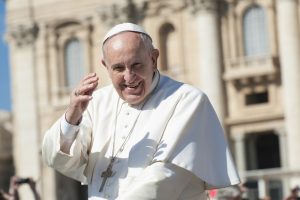Vietnam is poised to establish full diplomatic relations with the Vatican in the second half of this year, when Pope Francis is expected to embark on a papal tour, a first since ties between the Holy See and Hanoi were severed at the end of the Second Indochina War in 1975.
It’s the culmination of 25-years of quiet – and sometimes hard-fought and slow-moving – diplomacy that has enabled the Catholic Church to carry on with normal life in Vietnam, to buy property and build churches amid a gradual lifting of restrictions on the number of seminarians and ordained priests.
But it’s also the type of deal that hardline communist officials might have scoffed at 50 years ago when South Vietnam was annexed at the end of a 20-year war. Vietnam remained officially atheist, and religion was anathema for the one-party state.
Vatican Secretary for Relations with States Archbishop Paul Gallagher said that the Vatican is hoping to encourage authorities “along the line of greater religious freedom… but this is obviously a work in progress” – after several high-level meetings in Rome with Vietnamese officials.
A Joint Working Group, as a regular dialogue mechanism, was established in 2009 and last July, Vietnamese President Vo Van Thuong signed off on the Agreement on the Status of the Resident Papal Representative and the Office of the Resident Papal Representative in Vietnam.
That signature enabled the Vatican to name Archbishop Marek Zalewski, a 60-year-old Polish prelate and seasoned Vatican diplomat, as Vietnam’s first papal nuncio, from January 31. An invitation for Pope Francis to visit Vietnam was then extended.
Vietnam is the only communist country with a resident pontifical envoy and underpinning the fresh start in bilateral relations is Hanoi’s recognition of the role the Catholic Church has played in social life through charity, health care, and education.
The government can still restrict the number and size of parishes and insists on prior consultations regarding the appointment of bishops and archbishops. However, unlike China, the Vatican does not require Hanoi’s approval when making those appointments. Importantly, both sides promised not to interfere in each other’s internal affairs.
Gallagher said an upgrade in relations also represents a renewal of Vietnam’s attitude to the international community and the Church. He is expected to visit Hanoi next month and Vatican Secretary of State Cardinal Pietro Parolin will follow.
For Vietnam’s seven million Catholics, who make up 7.4 percent of the population, that should culminate in a papal tour comparable with Pope John Paul II’s historical visit to Poland in 1979 and usher in a new era of international acceptance.
Christianity remains the world’s largest religion with 2.4 billion adherents. Of them, 1.4 billion people are Catholic with the Vatican still wielding enormous influence within the international diplomatic arena.
Normalization of relations, analysts said, would enhance Vietnam’s prestige as a member of the United Nations Human Rights Commission and should alleviate some concerns in the United States in regards to religious freedom and perhaps human rights.
Hanoi will also gain diplomatic leverage with the U.S., including its 700,000-strong Vietnamese-Catholic community, and better its chances of being removed as a “country of particular concern” as listed by the U.S. Commission on International Religious Freedom.
It’s a designation Hanoi wants lifted amid a push for better ties with the West as a counter to Chinese influence across the region, which has been shaped through an open-door policy in trade that has also reinvigorated the cultural and religious landscapes.
That is not to say that everything is fine in Vietnam. Far from it. A Human Rights Watch report, released in January, counted more than 160 political prisoners while also calling for “an end to the systematic persecution of peaceful critics.”
However, the primary concern of Pope Francis remains the pastoral care of Vietnamese Catholics, which one analyst noted has also revitalized “Ostpolitik” – an appeasement designed to win freedom for a normal life among Catholics in Vietnam.
From that stand-point, at least, a papal tour and a normalization of relations between the Vatican and Vietnam can only be considered a diplomatic success.

































